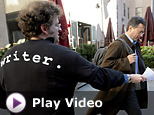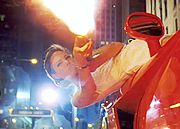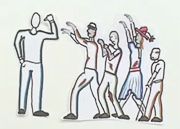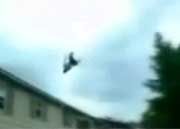Rape accusers in a 'tizzy' after cops 'bamboozled' them: Assange
December 22, 2010 - 10:17AM
Julian Assange feels he has been unjustly persecuted.
"They know not what they do 'cos they are only women"........................you sexist pig! Bamboozled by Police my arse...........the prick still doesn't understand or accept that he has done anything wrong........
WikiLeaks founder Julian Assange said the Swedish women who have accused him of sexual assault had got into a "tizzy" about the possibility they had caught a sexually transmitted disease from him.
Assange told the BBC that one account of what happened in August - the month at the centre of allegations against him - was that the two women had panicked when they found out they had both slept with him and went to police who "bamboozled" them.
He insisted he was fighting a Swedish extradition warrant because he believes "no natural justice" would occur in Sweden.
Alleged victims ... Anna Ardin, left, and Sofia Wilen.
"There are some serious problems with the Swedish prosecution," he said in an interview from the mansion of a wealthy supporter in eastern England where he must stay as part of his bail conditions.
Sweden wants Britain to extradite the 39-year-old Australian to face questioning over allegations from two women that he raped one of them and sexually assaulted the other in Stockholm in August.
Assange said he was used to attention from women but would not reveal how many women he had slept with.
"A gentleman certainly doesn't count," he said. "I've never had a problem with women. Women have been extremely helpful and generous with me and put up with me, assisting me in my work, caring for me, loving me and so on. That's what I'm used to."
Assange claimed that the Swedish authorities had asked that his Swedish lawyer be "gagged", adding that his offers to be interviewed by video link or by Swedish officials in Britain had been rejected.
"I don't need to be at the beck and call of people making allegations," he said.
"I don't need to go back to Sweden. The law says I... have certain rights, and these rights mean that I do not need to speak to random prosecutors around the world who simply want to have a chat, and won't do it in any other standard way."
He said that one account of what occurred in August was that after having discovered they had each had sex with him, they had got into a "tizzy", or a panic, about the possibility of sexually transmitted diseases.
As a result, he said, the women had gone to the police for advice "and then the police jumped in on this and bamboozled the women".
WikiLeaks has enraged Washington by releasing thousands of US diplomatic cables and US Vice President Joe Biden described Assange as a "hi-tech terrorist".
US officials are believed to be considering how to indict Assange for espionage.
In an interview with The Times on Tuesday, Assange compared WikiLeaks' "persecution" to that endured by Jews in the US in the 1950s.
Assange also confirmed that WikiLeaks was holding a vast amount of material about Bank of America which it intends to release early next year.
"We don't want the bank to suffer unless it's called for," Assange told The Times. "But if its management is operating in a responsive way there will be resignations," he said, without giving details about the material.
Shares in Bank of America have fallen amid speculation that it was a WikiLeaks target.
AFP
 Mr Wijat's friend Magic Rabbit
Mr Wijat's friend Magic Rabbit  http://www.easterlingentertainment.net
http://www.easterlingentertainment.netINLNews YahooMail HotMail GMail AOLMai
lUSA MAIL YahooMail HotMailGMail AOLMail MyWayMail CNNWorld IsraelVideoNs
INLNsNYTimes WashNs AustStockEx WorldMedia JapanNs AusNs World VideoNs WorldFinance ChinaDaily IndiaNs USADaily BBC EuroNsABCAust
WANs NZNews QldNs MelbAge AdelaideNs TasNews ABCTas DarwinNsUSA MA
Stories Video/Audio Reuters AP AFP The Christian Science Monitor U.S. News & World Report AFP Features Reuters Life! NPR The Advocate Pew Daily Number Today in History Obituaries Corrections Politics LocalNews BBC News
World_News_Nov_2007
AWN.bz
Australian Weekend News Publishing Group.. supports Independent Media...
A division of International News
INLNews ReutersNewsVideos inl.org inl.gov inl.co.nz YahooMail HotMail GMail AOLMail MyWayMail
www.inlnews.com www.inltv.com inl.org inl.gov inl.co.nz www.awn.com www.awntv.com
INLNews YahooMail HotMail GMail AOLMail MyWayMail USA MAIL
USA Weekly News EASY TO FIND HARD TO LEAVE
Visit International News Limited for the best values on: domain names .
Fringe Shows Have Talent Bebo YouTube MySpace Twitter FaceBook.
USA Weekly News EASY TO FIND HARD TO LEAVE
Click For Your Up To Date World Live Sports Scores
Triumph of Truth (Who's Watching The Watchers?) 7 Volumes - The Australian Weekend
Click here to get you daily dose of Real Independent USA News with Amy Goodman at Domocracy Now
CNNWorld IsraelVideoNs INLNsNYTimes WashNs WorldMedia JapanNs AusNs WorldVideoNs
WorldFinance ChinaDaily IndiaNs USADaily BBC EuroNsABCAust WANs NZNs
QldNs MelbAgeAdelaideNs TasNs ABCTas DarwinNs USAMail
| International News Limited Domain Pricing Per Year |
| .com* $9.99 | .net* $9.99 | .org* $9.99 | .info* $9.99 | .us* $9.99 | .biz* $9.99 | .ws* $9.99 | .name* $9.99 |
| Save even more on multi-year registrations! |







"Could become as important a journalistic tool as the Freedom of Information Act." - Time Magazine




Donate
What is Wikileaks ?
WikiLeaks is a not-for-profit media organisation. Our goal is to bring important news and information to the public.
We provide an innovative, secure and anonymous way for sources to leak information to our journalists (our electronic drop box). One of our most important activities is to publish original source material alongside our news stories so readers and historians alike can see evidence of the truth. We are a young organisation that has grown very quickly, relying on a network of dedicated volunteers around the globe. Since 2007, when the organisation was officially launched, WikiLeaks has worked to report on and publish important information. We also develop and adapt technologies to support these activities.
1.2 How WikiLeaks works
1.3 Why the media (and particularly Wiki leaks) is important
1.4 How WikiLeaks verifies its news stories
1.5 The people behind WikiLeaks
1.6 Anonymity for sources
2. WikiLeaks’ journalism record
2.1 Prizes and background
- the 2008 Economist Index on Censorship Freedom of Expression award
- the 2009 Amnesty International human rights reporting award (New Media)
2.2 Some of the stories we have broken
- War, killings, torture and detention
- Government, trade and corporate transparency
- Suppression of free speech and a free press
- Diplomacy, spying and (counter-)intelligence
- Ecology, climate, nature and sciences
- Corruption, finance, taxes, trading
- Censorship technology and internet filtering
- Cults and other religious organizations
- Abuse, violence, violation
- Changes in Guantanamo Bay SOP manual (2003-2004) - Guantanamo Bay’s main operations manuals
- Of Orwell, Wikipedia and Guantanamo Bay - In where we track down and expose Guantanamo Bay’s propaganda team
- Fallujah jail challenges US - Classified U.S. report into appalling prison conditions in Fallujah
- U.S lost Fallujah’s info war - Classified U.S. intelligence report on the battle of Fallujah, Iraq
- US Military Equipment in Iraq (2007) - Entire unit by unit equipment list of the U.S army in Iraq
- Dili investigator called to Canberra as evidence of execution mounts - the Feb 2008 killing of East Timor rebel leader Reinado
- Como entrenar a escuadrones de la muerte y aplastar revoluciones de El Salvador a Iraq - The U.S. Special Forces manual on how to prop up unpopular government with paramilitaries
- Change you can download: a billion in secret Congressional reports - Publication of more than 6500 Congressional Research Reports, worth more than a billion dollars of US tax-funded research, long sought after by NGOs, academics and researchers
- ACTA trade agreement negotiation lacks transparency - The secret ACTA trade agreement draft, followed by dozens of other publications, presenting the initial leak for the whole ACTA debate happening today
- Toll Collect Vertraege, 2002 - Publication of around 10.000 pages of a secret contract between the German federal government and the Toll Collect consortium, a private operator group for heavy vehicle tolling system
- Leaked documents suggest European CAP reform just a whitewash - European farm reform exposed
- Stasi still in charge of Stasi files - Suppressed 2007 investigation into infiltration of former Stasi into the Stasi files commission
- IGES Schlussbericht Private Krankenversicherung, 25 Jan 2010 - Hidden report on the economics of the German private health insurance system and its rentability
- The Independent: Toxic Shame: Thousands injured in African city, 17 Sep 2009 - Publication of an article originally published in UK newspaper The Independent, but censored from the Independent’s website. WikiLeaks has saved dozens of articles, radio and tv recordings from disappearing after having been censored from BBC, Guardian, and other major news organisations archives.
- Secret gag on UK Times preventing publication of Minton report into toxic waste dumping, 16 Sep 2009 - Publication of variations of a so-called super-injunction, one of many gag-orders published by WikiLeaks to expose successful attempts to suppress the free press via repressive legal attacks
- Media suppression order over Turks and Caicos Islands Commission of Inquiry corruption report, 20 Jul 2009 - Exposure of a press gagging order from the Turks and Caicos Islands, related to WikiLeaks exposure of the Commission of Inquiry corruption report
- Bermuda’s Premier Brown and the BCC bankdraft - Brown went to the Privy council London to censor the press in Bermuda
- How German intelligence infiltrated Focus magazine - Illegal spying on German journalists
- U.S. Intelligence planned to destroy WikiLeaks, 18 Mar 2008 - Classified (SECRET/NOFORN) 32 page U.S. counterintelligence investigation into WikiLeaks. Has been in the worldwide news.
- CIA report into shoring up Afghan war support in Western Europe, 11 Mar 2010 - This classified CIA analysis from March, outlines possible PR-strategies to shore up public support in Germany and France for a continued war in Afghanistan. Received international news coverage in print, radio and TV.
- U.S. Embassy profiles on Icelandic PM, Foreign Minister, Ambassador - Publication of personal profiles for briefing documents for U.S. officials visiting Iceland. While lowly classified are interesting for subtle tone and internal facts.
- Cross-border clashes from Iraq O.K. - Classified documents reveal destabalizing U.S. military rules
- Tehran Warns US Forces against Chasing Suspects into Iran - Iran warns the United States over classified document on WikiLeaks
- Inside Somalia and the Union of Islamic Courts - Vital strategy documents in the Somali war and a play for Chinese support
- Draft Copenhagen climate change agreement, 8 Dec 2009 - Confidential draft "circle of commitment" (rich-country) Copenhagen climate change agreement
- Draft Copenhagen Accord Dec 18, 2009 - Three page draft Copehagen "accord", from around Friday 7pm, Dec 18, 2009; includes pen-markings
- Climatic Research Unit emails, data, models, 1996-2009 - Over 60MB of emails, documents, code and models from the Climatic Research Unit at the University of East Anglia, written between 1996 and 2009 that lead to a worldwide debate
- The Monju nuclear reactor leak - Three suppressed videos from Japan’s fast breeder reactor Monju revealing the true extent of the 1995 sodium coolant disaster
- The looting of Kenya under President Moi - $3,000,000,000 presidential corruption exposed; swung the Dec 2007 Kenyan election, long document, be patient
- Gusmao’s $15m rice deal alarms UN - Rice deal corruption in East Timor
- How election violence was financed - the embargoed Kenyan Human Rights Commission report into the Jan 2008 killings of over 1,300 Kenyans
- Financial collapse: Confidential exposure analysis of 205 companies each owing above EUR45M to Icelandic bank Kaupthing, 26 Sep 2008 - Publication of a confidential report that has lead to hundreds of newspaper articles worldwide
- Barclays Bank gags Guardian over leaked memos detailing offshore tax scam, 16 Mar 2009 - Publication of censored documents revealing a number of elaborate international tax avoidance schemes by the SCM (Structured Capital Markets) division of Barclays
- Bank Julius Baer: Grand Larceny via Grand Cayman - How the largest private Swiss bank avoids paying tax to the Swiss government
- Der Fall Moonstone Trust - Cayman Islands Swiss bank trust exposed
- Over 40 billion euro in 28167 claims made against the Kaupthing Bank, 23 Jan 2010 - List of Kaupthing claimants after Icelandic banking crash
- Northern Rock vs. WikiLeaks - Northern Rock Bank UK failed legal injunctions over the ¡Ì24,000,000,000 collapse
- Whistleblower exposes insider trading program at JP Morgan - Legal insider trading in three easy steps, brought to you by JP Morgan and the SEC
- Eutelsat suppresses independent Chinese-language TV station NTDTV to satisfy Beijing - French sat provider Eutelsat covertly removed an anti-communist TV channel to satisfy Beijing
- Internet Censorship in Thailand - The secret internet censorship lists of Thailand’s military junta
- Church of Scientology’s ’Operating Thetan’ documents leaked online - Scientology’s secret, and highly litigated bibles
- Censored Legion de Cristo and Regnum Cristi document collection - Censored internal documents from the Catholic sect Legion de Cristo (Legion of Christ)
- US Department of Labor investigation into Landmark Education, 2006 - 2006 investigative report by the U.S. Department of Labor on Landmark Education
- Report on Shriners raises question of wrongdoing - corruption exposed at 22 U.S. and Canadian children’s hospitals.
- Claims of molestation resurface for US judo official
- Texas Catholic hospitals did not follow Catholic ethics, report claims - Catholic hospitals violated catholic ethics
3. Short essays on how a more inquiring media can make a difference in the world
3.1 The Malaria Case Study: the antidote is good governance born from a strong media
3.2 The importance of principled leaking to journalism, good government and a healthy society
3.3 Should the press really be free?
- The right to vote does not exist except for share holders (analogous to land owners) and even there voting power is in proportion to ownership.
- All power issues from a central committee.
- There is no balancing division of power. There is no fourth estate. There are no juries and innocence is not presumed.
- Failure to submit to any order may result in instant exile.
- There is no freedom of speech.
- There is no right of association. Even romance between men and women is often forbidden without approval.
- The economy is centrally planned.
- There is pervasive surveillance of movement and electronic communication.
- The society is heavily regulated, to the degree many employees are told when, where and how many times a day they can go to the toilet.
- There is little transparency and something like the Freedom of Information Act is unimaginable.
- Internal opposition groups, such as unions, are blackbanned, surveilled and/or marginalized whenever and wherever possible.
3.4 Could oppressive regimes potentially come to face legal consequences as a result of evidence posted on WikiLeaks?
| Flip From Roof to Pool Watch a 360 degree flip from the roof to the pool. |
| Jason Sells Machetes What do you do when your career as a maniac ends? |
| Perfected: The Ann Coulter Song A sarcastic tribute to the queen of bigotry. |
| Blake Lively on 'Gossip Girl' Blake talks about her character Serena van der Woodsen. |
| Sponsored Video: People Think I’m a Statue Everyone marches to the beat of their own drummer. |
- Man held after detective is knocked down
- Turkey ups pressure over Kurdish rebels
- Thousands flee floods in Mexico
- Critics call for Met chief to be replaced
- Papworth suspends heart transplants
- Tennis coach jailed for sex with minor
- Minister fined for using mobile at the wheel
- » More:
- UK news
- Video news
- Oddly Enough
- Y! Answers
- Birdie-burst lifts Verplank
- Guinness Prem - RFU signs agreement with clubs
- Top 14 - Biarritz labour to narrow win
- ATP Tour - Masters Cup calculus - Latest
- ATP Tour - Gasquet ends Murray's Shanghai dream
- Celtic League - Round up: Parks fires for Glasgow
- Celtic League - Leinster missing Contepomi
- » More:
- Football
- Fantasy Football
- F1
- Cricket
- Rod Stewart falls for new model -- model trains
- Jagger gets rocks off at Indian music festival
- Garner gets mixed reviews in Broadway debut
- Prince Harry spends day with Lesotho orphans
- Richard & Judy call time on chat show
- Hollywood writers call for strike in royalties dispute
- Emily's shock X Factor exit
Marketplace
Donate £2 a month and join together to support research into cancer.
Without Sky channels on cable? Sky TV, Sky Talk and Sky Broadband all for £26/month. Join in.
 Save on the latest Nokia handsets
Save on the latest Nokia handsets
Find great deals on the latest Nokia mobile phones - 8600, N95 and more.
Compare offers from multiple sites, prices starting from £79
| Office Zombies It isn't too late to whip out a kick- |

Exclusive trailer: Wanted
Wanted tells the tale of one apathetic nobody’s transformation into an unparalleled enforcer of justice. » More

White 'roo wows zoo
Visitors are flocking to a zoo in Buenos Aires to see a completely white baby kangaroo in its mother's pouch. » More
Yahoo! Pulse

Emily quits over 'attack'
'X Factor' finalist Emily Nakanda has pulled out of the show after she was caught attacking a teenage girl in a 'happy slapping' video. » More

Alonso leaves McLaren
Lewis Hamilton will have a new team-mate in 2008 - former champ Fernando Alonso has left McLaren. » More

Writers set to strike
What will the first Hollywood writers' strike in 20 years mean for your favorite shows and films? » Video
| Werewolf's Hair Hear some Halloween rock in the spirit of 'Monster Mash. |
| Thad: Halloween Looks like Thad is 'Sonny' with no chance of Cher. |
| Last Second Win Watch as Trinity College takes the ball across the field with no time left on the clock. |
| Crushed by Velvet What is real and what is TV? |
| Elevator Halloween: 2 The zombie infestation continues. |
| That's Illegal! What you can't do in Florida while wearing a bikini. |
| The Year in Semi- Rocketboom brings out the best of the 'sports' videos from last year. |
| TV Squad Daily Brigitte discusses Simon Cowell's lap dancing obsession. |
| Best Week Ever at the Office Convention BWE's Brian Fass attends the first ever Office convention in Scranton, PA. |
| Vampires in Alaska The Spill Crew discuss 30 Days of Night and why Blade didn't show up. |
| Halloween at the Office Does everyone in your office dress up? |
| Instantly Awesome Jeans Find out how some espresso beans and a cheese grater can add style to your jeans. |
| Seinfeld: The Implant Jerry suspects his girlfriend has fake breasts. |
| Human Tetris Part 2 Are the contestants getting any better at this game? |
| Fish Wish Sometimes you should just be happy with what you get. |
| Just Business A grim story of crime and betrayal. |
| Unsexy Underwear This viral ad offers an unusual solution for stopping war. |
| G. A war film done in stunning stop- |
| Fastest Hands in the Land Can he really hit all five targets in less than one second? |
| Bizarre Halloween Pumpkins Photo montage of creepy jack- |





























































